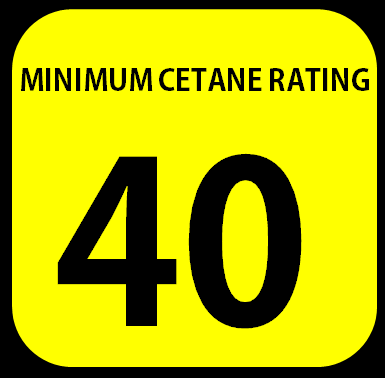Cetane number

Cetane rating, also known as cetane number is a measurement of the quality or performance of diesel fuel. The higher the number, the better the fuel burns within the engine of a vehicle. The cetane number is similar to the octane rating in that it is a rating assigned to a fuel to rate the quality of its combustion. The difference is that octane rating rates gasoline whereas cetane rates diesel.[2] Just as higher performance gasoline vehicles require fuels with a higher octane rating, high performance diesel vehicles require fuel with a higher cetane rating.
The cetane rating of a specific diesel mixture is based off of how much cetane—a clear, colourless hydrocarbon that ignites under high pressures—is in some fuel. Pure cetane represents the highest purity of diesel fuel possible, and thus has a cetane rating of 100.[3]
The main difference between cetane and octane ratings is that the octane rating represents how well a fuel can resist pre-ignition due to compression—ensuring the fuel ignites only from a spark from the spark plug. However, the cetane number measures the delay in the ignition time of the fuel. In other words, it is how minimized the delay is between when the fuel is injected into the chamber and when the combustion begins. Unlike gasoline engines which attempt to resist any ignition due to compression, diesel engines rely on this compression ignition and thus no spark is involved. A higher cetane number simply means the time between when the fuel is injected into the combustion chamber and when the fuel ignites is minimized. This means the fuel has the ability to ignite more easily and readily due to compression. This shorter delay time results in more complete fuel combustion.[2]
For a video explaining this type of ignition in depth, click here.
Benefits of a High Cetane Rating
A higher cetane number resulting in quicker ignition of the fuel leads to less non-ignited fuels building up inside the combustion chamber, as well as more complete fuel combustion. Better fuel combustion and quick ignition leads to quicker starting for vehicles, as well as an engine that operates more quietly as only misted fuel is ignited and buildup inside the engine is minimized. Moreover, fuel efficiency improves with more complete combustion and harmful emissions are reduced.
Generally, the owners manual that comes with new vehicles has manufacturers recommendations as to which cetane rating a vehicle should use to ensure the engine is operating at its peak.
For Further Reading
- Diesel engine
- Fuel
- Fuel efficiency
- Combustion
- Octane rating
- Or explore a random page
References
- ↑ Made internally by a member of the Energy Education team. Adapted from: http://www.gasolineadvertising.com/product/FSD/Pump_OCRatingA.php
- ↑ 2.0 2.1 Christine & Scott Gable. (May 14, 2015). Diesel Fuel Cetane Rating [Online]. Available: http://alternativefuels.about.com/od/researchdevelopment/a/cetane.htm
- ↑ Chip Express. (May 14, 2015). Rating Diesel [Online]. Available: http://www.chipexpress.com/articles/rating-diesel-understanding-cetane-numbers/

